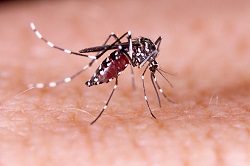Trending Science: WHO declares Zika virus emergency
The emergency, declared by WHO director Dr Margaret Chan, is warranted because of the speed at which the mosquito-borne virus is spreading and its suspected link to an alarming spike in babies being born in Brazil with abnormally small heads, a condition called microcephaly. Reports of a serious neurological condition, called Guillame-Barre Syndrome, which can lead to paralysis, have also arisen in areas where the virus has been reported. Deaths from the Zika virus itself are considered to be very rare, with symptoms usually only including a mild fever, headache, joint pain, rash and conjunctivitis. Many people do not exhibit any symptoms at all if they contract the virus. It is the suspected link with microcephaly that is the greater cause for concern. Brazil has been the most heavily affected country but confirmed cases of the virus have also been noted across Latin America and the Caribbean. The Pan American Health Organisation has placed 28 nations on its list of countries where the virus is circulating. Reports of the virus have also been confirmed in the US state of Texas and New South Wales, Australia. With the WHO declaration of a formal public health emergency of international concern, funding will be triggered to ascertain if the virus is responsible for the large number of microcephaly cases. Resources will also be put behind a large effort to prevent pregnant women from becoming infected and to contain the virus through mosquito control. ‘The experts agreed that a causal relationship between Zika infection during pregnancy and microcephaly is strongly suspected, though not yet scientifically proven... however members of the committee agreed that the situation meets the conditions for a public health emergency of international concern,’ commented Dr Chan. The WHO said last week that the virus was ‘spreading explosively’ in the Americas, with as many as three or four million infections possible over a 12 month period. In Brazil, President Dilma Rousseff has deployed 220, 000 troops to support public health officials with mosquito-eradication campaigns in the absence of a vaccine or medication against the virus. Despite the lack of evidence, Brazilian health minister, Marcelo Castro, has commented that researchers are convinced that the reported spike in microcephaly cases was caused by the virus being spread by mosquitoes. Brazilian researchers are currently working with their counterparts in the United States to develop a vaccine but one is not expected to be ready for at least three to five years. Dr Jeremy Farrar, Director of the Wellcome Trust, said: ‘As with Ebola, Zika has once again exposed the world’s vulnerability to emerging infectious diseases and the devastation they can unleash... we must put in place the permanent reforms, health systems’ strengthening and proactive research agenda to make the global health system more resilient to the threat of future pandemics.’
Countries
Brazil



